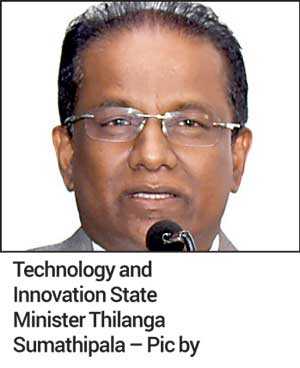Wednesday Feb 18, 2026
Wednesday Feb 18, 2026
Wednesday, 11 December 2019 00:33 - - {{hitsCtrl.values.hits}}
By Shailendree Wickrama Adittiya
Sri Lanka is eying closer relations with Korea to boost technology transfers and knowledge sharing, including internship opportunities as measures to foster cooperation on innovation  between the two countries, a top official said yesterday.
between the two countries, a top official said yesterday.
Technology and Innovation State Minister Thilanga Sumathipala speaking at the completion ceremony of a Korean Intellectual Property (IP) Sharing Project as Chief Guest he said that while the newly-elected Government was currently not in a position to conclude a MoU at the moment, it was keen to sign an MOU between the countries in the near future.
“I can’t see any partner or country that can come as close to Sri Lanka as the Korean Government,” Sumathipala said, adding that he hoped relations between the countries would lead to internship opportunities for Sri Lankans at the top firms in Korea.
He also spoke about the importance of the two segments of the project, a water treatment system for Chronic Kidney Disease (CKD) areas and a coconut oil expeller. The project was promoted by the Korean State institute Korean Intellectual Property Office (KIPO) and maintained by the Government subsidiary Korea Invention Promotion Association (KIPA). Local partners of the project were the State Ministry of Technology and Innovation and Coordinating Secretariat for Science, Technology, and Innovation (COSTI).
Ambassador of the Republic of Korea in Sri Lanka Heon Lee, who delivered a congratulatory speech, said that official diplomatic relations between the two countries were established in 1977. “Since then, we have come a long way together and have maintained cordial bilateral partnership based on mutual respect,” Lee said, adding that Korea had been promoting various projects in education, transportation, water resources, sanitation, and regional development in Sri Lanka.
He also said that the project was an excellent display of the cooperation between the Sri Lankan and Korean Governments.
According to the Project Manager, Kwangmin Ahn of KIPA, the project was carried out on the request of the Sri Lankan Government. “We had over 50 country candidates but due to budget limitations, we had to choose two candidates,” he said, adding that they chose Sri Lanka because of the strong interest and enthusiasm shown by the Government.
As for the change of government that took place during the duration of the project, Ahn said that it was quite unexpected as they were not aware of the Presidential Election held this year. “We didn’t expect that it can have such a tremendous effect but fortunately, because of ministerial efforts, we did not have any problems with our projects,” he added.
He also said that having worked with many developing countries, this was the first time he saw such a positive attitude from the Government. “You have good technology and the Korean Government wants to develop these technologies,” Ahn said, adding that they would continue to work with Sri Lanka in the future if given the opportunity.
Of the three machines to be installed under the water treatment system, one has been completed and the remaining two are currently under construction and will be completed in January. The two coconut oil expellers have been completed.
While this Korean IP Sharing Project is a short-term project of one year and was officially concluded yesterday, Korea is willing to help with maintenance and management of the machinery in the future. Meanwhile, education programs for local residents and technicians were also conducted in November.
KIPA Vice President Du-Seong Lee and KOPA Deputy Director – Multilateral Affairs Hyuntae Kim also spoke about the project and the process behind it. According to them, the Higher Education, Technology and Innovation Ministry first recognised the seriousness of the problem with CKDu, especially in the northern part of Anuradhapura.
“Your Government asked for some cooperation from our side so KIPO accepted this project after an evaluation process and KIPO and KIPA decided to start this project to develop a water treatment system,” Ahn said.
The KIPA and KIPO representatives also explained that the coconut oil expeller project was initiated in 2017 but that there had been a request for improvements to be made to the machines.
Teams from Korea have made three visits to the country for the project, with a visit in May being the first. Having met representatives from the Government during this visit, the team went back and looked for a good Korean company which had the patent knowledge and skills required for the project.
“After having a discussion, we developed a blueprint and made a second trip to Sri Lanka in August and a third in September. During that time, we shared the patent and technology information with our Sri Lankan counterpart and decided on the exact machines we should make and what kind of patenting should be used,” Ahn said.
The blueprint and technology was then sent to Sri Lanka as the Government has its own technological institutions so the machine could be made by the countries together. While Glory and Tech provided the water solutions from Korea, the National Water Supply and Drainage Board is making efforts to combat CKDu through water sampling and the installation of reverse osmosis (RO) plants.